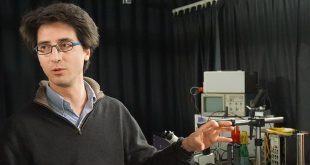Anonymization is still sometimes criticized as a practice that supposedly makes data worthless, as it deletes important information. The CNIL decided to prove the contrary through the Cabanon project conducted in 2017. It received assistance from the IMT big data platform, TeraLab, for anonymizing the data of New York taxis and showing the possibility of creating a transportation service. …
Read More »Search Results for: digital identity
Passwords: security, vulnerability and constraints
Hervé Debar, Télécom SudParis – Institut Mines-Télécom, Université Paris-Saclay What is a password? A password is a secret linked to an identity. It associates two elements, what we own (a bank card, badge, telephone, fingerprint) and what we know (password or code). Passwords are very widely used, for computers, telephones, banking. The simplest form is the numerical code (PIN), with …
Read More »New Caledonia: a mine challenging democracy
When an industrial mining complex wanted to release a pollutant into their lagoon in the late 1990s, the inhabitants of the southern province of Grande Terre took action. In their fight against the environmental and cultural danger, the citizens found it difficult to make their voices heard. Today, almost 20 years have passed since the scientific and social controversy first …
Read More »Iris recognition: towards a biometric system for smartphones
Smartphones provide a wide range of opportunities for biometrics. Jean-Luc Dugelay and Chiara Galdi, researchers at Eurecom, are working on a simple, rapid iris recognition algorithm for mobile phones, which could be used as an authentication system for operations such as bank transactions. Last name, first name, e-mail address, social media, photographs — your smartphone is a complete summary …
Read More »Yaneck Gottesman
Télécom SudParis | #Biometrics #Metrology #Optics
Read More »What is net neutrality?
Net neutrality is a legislative shield for preventing digital discrimination. Regularly defended in the media, it ensures equal access to the internet for both citizens and companies. The topic features prominently in a report on the state of the internet published on May 30 by Arcep (the French telecommunications and postal regulatory body). Marc Bourreau, a researcher at Télécom ParisTech, …
Read More »FEMTO Engineering: a new component of the TSN Carnot institute
In July 2016 the Ministry for Education and Research renewed the Télécom & Société numérique Carnot institute accreditation and at the same time, the institute presented a new component: the FEMTO Engineering Center for Technological Development. We interviewed the Director of the FEMTO-ST laboratory, Laurent Larger, who told us a little more about the identity of this new component of the …
Read More »Gender diversity in ICT as a topic of research
Chantal Morley, a researcher at Institut Mines-Telecom Business School, works on the social construction of the masculinity of Information and Communication Technologies (ICT). Various empirical studies analyzed using a structurationist framework have allowed her to understand how stereotypes linking gender and technology are maintained or broken down through interactions, often spoken, on a daily basis. The notion of social inclusion …
Read More »Research and economic impacts: “intelligent together”
What connections currently exist between the world of academic research and the economic sphere? Does the boundary between applied research and fundamental research still have any meaning at a time when the very concept of collaboration is being reinterpreted? Godefroy Beauvallet, Director of Innovation at IMT and Vice Chairman of the National Digital Technology Council provides some possible answers to …
Read More »From the vestiges of the past to the narrative: reclaiming time to remember together
The 21st Century is marked by a profound change in our relationship with time, now merely perceived in terms of acceleration, speed, changes and emergencies. At Mines Nantes, the sociologist Sophie Bretesché has positioned herself at the interfaces between the past and the future, where memory and oblivion color our view of the present. In contexts undergoing changes, such as …
Read More » I'MTech L'actualité scientifique et technologique de l'IMT
I'MTech L'actualité scientifique et technologique de l'IMT









